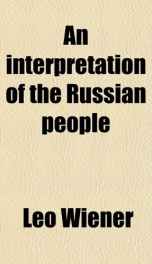an interpretation of the russian people

Purchase of this book includes free trial access to www.million-books.com where you can read more than a million books for free. This is an OCR edition with typos. Excerpt from book: in THE NATIONAL IDEALS OF EUSSIAN LITEEATUEE WHEN Peter the Great broke with the tradition of the past there was not even a native Eussian language in which to express the accumulating new ideas or to make an appeal to the people. The Church-Slavic was too far removed from the spoken idiom and ill-adapted for modern, progressive ideas. The Great Tsar laid his hands upon the old script and had it transformed so as to bring it in keeping with the Eoman alphabet in use in the West. But he was powerless to dictate the norm for a literary language, for he was conscious that the spoken idiom was not better adapted for it than the mystic language of the Church. Yet the very use of the new, "civic" alphabet at once separated the incipient secular literature from the influence of the ecclesiastic writings, and within a century the spoken form was purified, normalized and perfected by the writings of Lomonosov, Derzhavin, Karamzin, and a host of minor authors, until it became one of the most pliable and perfect languages in Europe. Its vocabulary is far richer than either the German or English, and it is admirably fitted to represent the most delicate poetical, philosophic, and scientific shades of connotations. The last of the great literary languages of Europe to forge its way to the front, it is not surpassed by any in all the elements necessary to preserve for it an enduring place in history. The Eighteenth Century was naturally an age of imitation for Eussian literature. The French pseudo-classic influence was abroad, and even the more fortunately situated Germany had little to show that was not at that time coarsely borrowed from France. Frederic the Great boasted that he served his native literature most by leaving it alone and devoting himself strictly to the propagation of...
Info about the book
Author:
Series:
Unknown
ASIN:
B001167G2M
Rating:
3/5 (3)Your rating:
0/5
Languge:
English
Users who have this book
Users who want this book
What readers are saying
What do you think? Write your own comment on this book!
write a commentGenre
if you like an interpretation of the russian people try:
Do you want to exchange books? It’s EASY!
Get registered and find other users who want to give their favourite books to good hands!


